|
|
|
Sort Order |
|
|
|
Items / Page
|
|
|
|
|
|
|
| Srl | Item |
| 1 |
ID:
180832
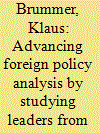

|
|
|
|
|
| Summary/Abstract |
Using the concept of ‘context sensitivity’ as organizing theme, this article explores different avenues of advancing foreign policy analysis (FPA) scholarship based on insights from the global South. Since foreign policy decision-makers in the global South operate in (at times very) different political environments than their western counterparts, the applicability of FPA approaches cannot be taken as a given, which is why their context sensitivity (i.e., the extent to which core concepts and indicators contained in those approaches travel to non-western settings) needs to be explored. This article suggests that our understanding of the motives and behaviours of individual decision-makers can be advanced in three distinct ways based on insights from the global South. First, several of the FPA constructs that focus on individual decision makers have seen hardly any applications to non-western cases, which is why the latter contributes to ascertaining the analytical scope of those constructs. Second, taking more fully into account the differences in decision-making environments within which leaders from the global South operate can advance leader-oriented FPA approaches by helping to specify certain theoretical assumptions proposed by them. Finally, the aspiration to analyse leaders from the global South can advance FPA in terms of method by, for instance, developing non-English language coding schemes for profiling leaders based on speech acts that are cognizant of the specificities of individual languages, while at the same time allowing for measurement equivalence across different languages.
|
|
|
|
|
|
|
|
|
|
|
|
|
|
|
|
| 2 |
ID:
182937


|
|
|
|
|
| Summary/Abstract |
Many countries in the global South have rapidly aging populations. The COVID-19 pandemic has been especially hard on older adults in these countries, who mainly depend on kin for care. The pandemic has shown that a recommitment to public investment in their well-being is needed.
|
|
|
|
|
|
|
|
|
|
|
|
|
|
|
|
| 3 |
ID:
151213
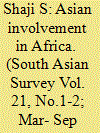

|
|
|
| 4 |
ID:
108143
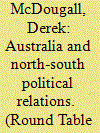

|
|
|
|
|
| Publication |
2011.
|
| Summary/Abstract |
North-South issues as such do not figure prominently in Australia's international policy but are mostly implicit. These issues arise particularly in the context of Australia's relations with countries in its immediate vicinity, including the South Pacific, Indonesia and East Timor. There are also some global issues in the North-South context where Australia is affected. Australian governments, in developing policies relating to this context, have been influenced by a 'practical realism' that puts first priority on Australian interests as perceived by governments at any given time. The way in which those policies have been developed, in both the regional and the global contexts, can be assessed through an examination of issues relating to security and international economic relations. Australia's alliance relationship has a strong bearing on the way Australia approaches the security issues. In relation to international economic issues there are many commonalities with fellow producers of raw materials in the Global South.
|
|
|
|
|
|
|
|
|
|
|
|
|
|
|
|
| 5 |
ID:
138955
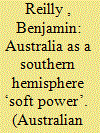

|
|
|
|
|
| Summary/Abstract |
The 2014 Group of 20 (G20) leaders’ meeting in Brisbane was hailed as the largest gathering of international leaders ever held in Australia. While media attention was focused on the presidents of great powers of the northern hemisphere—the USA, China and Russia in particular—the meeting also featured the first Australian gathering of the major powers of the southern hemisphere, including Argentina, Brazil, Indonesia, South Africa and, of course, Australia itself.
|
|
|
|
|
|
|
|
|
|
|
|
|
|
|
|
| 6 |
ID:
108149
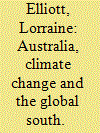

|
|
|
|
|
| Publication |
2011.
|
| Summary/Abstract |
Australia's climate change relationship with developing countries is framed by the 1992 United Nations Framework Convention on Climate Change and the 1997 Kyoto Protocol. Under those agreements, Australia has committed to take a lead in cutting greenhouse gas emissions and to provide technological and financial support to developing countries. In practice, Australian governments of both political hues have adopted a somewhat ambiguous and ambivalent attitude to developing countries within climate change politics and their fulfilment of those commitments has been uneven. This is particularly so if the concept of the 'Global South' is expanded from developing countries to include those people who are vulnerable to the environmental, social and economic impacts of climate change.
|
|
|
|
|
|
|
|
|
|
|
|
|
|
|
|
| 7 |
ID:
164675
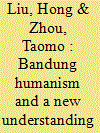

|
|
|
| 8 |
ID:
162628
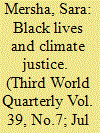

|
|
|
|
|
| Summary/Abstract |
This article shares examples of the leadership of Black communities and social movements in the struggle for climate justice, in four different parts of the world: resisting extraction and promoting community health in Nigeria; addressing extreme climate impacts and building people’s sovereignty in Haiti; confronting repression, defending territory and Mother Earth in Honduras; and cultivating community control and building a land-based movement in the US. Together, these examples have rich lessons to share around the importance of linking climate justice with racial justice; of combining strategies of resistance with those of creating alternative models; of maintaining focus on Black communities’ connections with land, territory and Mother Earth; of recognising and creating space for women’s leadership; and of intersectionality across geography and sector.
|
|
|
|
|
|
|
|
|
|
|
|
|
|
|
|
| 9 |
ID:
124212
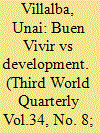

|
|
|
|
|
| Publication |
2013.
|
| Summary/Abstract |
The concept of development and the ways of achieving it have been widely criticised from various viewpoints. In the face of the apparent obsolescence of long-standing models, the novel Buen Vivir approach (roughly translated as 'living well' or 'good living'), which has arisen in different parts of Latin America, may offer an alternative paradigm. However, the implementation of policies that could lead to this Buen Vivir model requires profound changes that follow a range of complex transitions, which may often even seem contradictory in countries like Ecuador, where this approach has already been enacted in the new constitution and laws but where old development practices still continue. Accepting the plurality of visions on Buen Vivir (from the indigenous ontology to the 'Western-modern' approach), while at the same time positing common ground in which to define a new development strategy able to overcome a natural resource extraction-based economic pattern, is one of the immediate challenges.
|
|
|
|
|
|
|
|
|
|
|
|
|
|
|
|
| 10 |
ID:
123538


|
|
|
|
|
| Publication |
2013.
|
| Summary/Abstract |
South-South cooperation is assumed to reflect a deep attitude of solidarity among nations of the global South. We point out that, although India, Brazil and South Africa (ibsa) present themselves as being in the vanguard of South-South cooperation, their foreign economic policies make such solidarity somewhat thin. We focus on examples in which these three states deliberately but also unintentionally create sub-optimal conditions for the development of some of their Southern neighbours. This outcome reflects the policies that emerging centres of accumulation in the South are promoting, as well as the material interests of the dominant class alliances in the aforementioned states. There is a need for close scrutiny of the foreign economic policies of dynamic developing economies, and for closer multilateral coordination among the states of the global South.
|
|
|
|
|
|
|
|
|
|
|
|
|
|
|
|
| 11 |
ID:
108958


|
|
|
| 12 |
ID:
144278
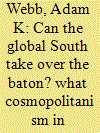

|
|
|
|
|
| Summary/Abstract |
As the West’s centrality fades, the global South may have a decisive influence in shaping future world order. Will that future see a retreat from globalisation to hard-edged particularisms? Or will the emerging post-Westphalian global society let the global South take over the baton of cosmopolitan institution building in its own way? This article draws on a multi-country survey of educated youth to find promising signs of imagined common ground with other countries. It suggests the flavours of cosmopolitan integration that the global South is likely to support in coming decades.
|
|
|
|
|
|
|
|
|
|
|
|
|
|
|
|
| 13 |
ID:
192891
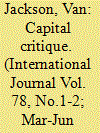

|
|
|
|
|
| Summary/Abstract |
Advocates of progressive political economy agree that the neo-liberal economic order has worsened environmental degradation, worker precarity, and oligarchy, but what are the alternatives? This article relates left-progressive discourses about concrete approaches and policy ideas to implications for the global economic order. While progressives explicitly seek a more social democratic global order, the various policy initiatives in the progressive imaginary implicitly involve approaches to order-building that are in scarcely acknowledged competition with one another. While neo-Keynesianism, justice for the Global South, a Global Green New Deal, and degrowth are all anti–neo-liberal approaches that pursue the same broad aims—reducing inequality within the Global North, raising standards of living and buffering structural violence in the Global South, and responding to the climate crisis—these goals potentially exhibit the tensions of a trilemma.
|
|
|
|
|
|
|
|
|
|
|
|
|
|
|
|
| 14 |
ID:
140961
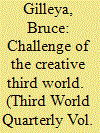

|
|
|
|
|
| Summary/Abstract |
This article is a contribution to recent literature on the shape of the polycentric world order. It argues that the Third World remains a valid concept for describing the interests and ideas that shape the foreign policies of many key non-Western states. However, the Third World has changed in a fundamental way. The article describes the historical emergence and contemporary manifestations of a ‘creative’ Third World in contrast to the ‘protest’ Third World of the past. It describes the nature of this shift and how it is reshaping Western leadership. It argues that the main challenge for the West is to create a coherent pluralism in international order that embraces this creative Third World.
|
|
|
|
|
|
|
|
|
|
|
|
|
|
|
|
| 15 |
ID:
141142


|
|
|
|
|
| Summary/Abstract |
The emergence of China as a development actor across the global South has raised significant questions regarding the extent to which the country presents new development opportunities to its compatriots in the South. My aim is to reflect on and parse out the experiences and policies that have shaped China’s development to assess how it can inform the field of development studies. I argue that we need to critically engage in China’s development process, as China’s own development has led to the emergence of many more problems than solutions, ranging from increasing inequality to exclusionary development practices pertaining to ethnic minorities.
|
|
|
|
|
|
|
|
|
|
|
|
|
|
|
|
| 16 |
ID:
099051


|
|
|
|
|
| Publication |
2010.
|
| Summary/Abstract |
In this article, we depict climate as an issue which deterritorialises existing geopolitical realities in a manner which suits the discourses of both elite science and corporate globalisation. In this deterritorialisation, the politics of place, of difference, are removed; the divisions between North and South - the Minority and Majority Worlds - must melt away as all peoples become citizen-consumers in need of a morally conservative (using global archetypal myths of flood and fire) but economically neo-liberal global soul with which to confront the global nemesis of climate change. This deterritorialisation is constructed from a Northern (particularly a Western European) position. It emerges from post-material and post-industrial environmental discourses, largely ignoring the discourses and frames of post-colonial environmentalism (and environmental debt) which are far more appropriate when describing the environmental and developmental realities of the Global South. In the article, we introduce the case of India, as both its civil society and governments wrestle with the new realities of the global climate change agenda. We show how India's official framing of climate change discourse, overwhelmingly dictated and driven by the imperatives of economic growth, continues to oscillate between the 'scientific' underpinnings of deterritorialised-global representations of climate change and the growing trends to reterritorialise multifaceted climate space through geopolitical-geoeconomic reasonings.
|
|
|
|
|
|
|
|
|
|
|
|
|
|
|
|
| 17 |
ID:
106661
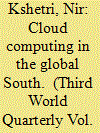

|
|
|
|
|
| Publication |
2011.
|
| Summary/Abstract |
Cloud computing has started to transform economic activities in the global South. Many businesses are taking advantage of the pay-as-you-go model of the technology, and its scalability and flexibility features, and government agencies in the South have been investing in cloud-related mega-projects. Cloud-based mobile applications are becoming increasingly popular and the pervasiveness of cellphones means that the cloud may transform the way these devices are used. However, findings and conclusions drawn from surveys, studies and experiences of companies on the potential and impact of cloud computing in the developing world are inconsistent. This article reviews cloud diffusion in developing economies and examines some firms in the cloud's supply side in these economies to present a framework for evaluating the attractiveness of this technology in the context of evolving needs, capabilities and competitive positions. It examines how various determinants related to the development and structure of related industries, externality mechanisms and institutional legitimacy affect cloud-related performances and impacts.
|
|
|
|
|
|
|
|
|
|
|
|
|
|
|
|
| 18 |
ID:
183869
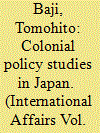

|
|
|
|
|
| Summary/Abstract |
This article examines Japanese colonial policy studies (shokumin seisaku gaku) with a particular focus on its relationship with the distinct region of ‘Nan'yo’ (the South Seas). Specifically analysing the works of Takekoshi Yosaburo (1865–1950), Nitobe Inazo (1862–1933) and Yanaihara Tadao (1893–1961), it seeks to uncover the ways in which the exponents of this study area accounted for Nan'yo based on their conceptions of race. It also shows how they inflicted envisaged racial hierarchies on the southern Pacific and how such attempts were related to colonial policy debates behind the practice of Japanese imperialism. Part of the findings point out that Takekoshi's and Nitobe's comparable projections of strict racial hierarchies on the Malays served to justify the southward colonization of the Japanese. Yanaihara's depiction of Nan'yo islanders as radically underdeveloped was tailored to championing Japan's sustained espousal of the League Mandate. The article argues that their accounts of Nan'yo formed part of a transnational knowledge chain about colonial and racial victimization. Like their western counterparts including Gustav Le Bon, Paul Leroy-Beaulieu, Paul S. Reinsch and J. A. Hobson, they built purported racial pyramids with the tropical areas at their bottom, the bulk of which correspond to today's global South. They have been accomplices in this colonial present.
|
|
|
|
|
|
|
|
|
|
|
|
|
|
|
|
| 19 |
ID:
128888
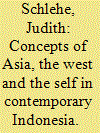

|
|
|
|
|
| Publication |
2013.
|
| Summary/Abstract |
This paper explores the imaginations of Asia, the West and various self-concepts in contemporary, post-Reformasi Indonesia. Departing from a problematization of the underlying concepts in recent social science literature, the author asks how Indonesians construct their moral order and their sense of Self, 'Asia' or 'the East' by constructing a Western counterpart. This question is traced with respect to various religious and spiritual orientations and to Indonesian popular culture. Finally, relocated orientations towards other imagined centres in the Global South and East are considered as potential indicators of an increasingly decentred world. The study is grounded in empirical fieldwork with people from various walks of life in different regions of Indonesia.
|
|
|
|
|
|
|
|
|
|
|
|
|
|
|
|
| 20 |
ID:
108096
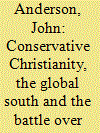

|
|
|
|
|
| Publication |
2011.
|
| Summary/Abstract |
This article explores conservative Christian contributions to debates over sexual orientation, focusing in particular on the way in which Northern Christians struggling to win their battles at home look to the global South for allies and support. This is made easier by the fact that global Christianity is once more overwhelmingly a Southern religion that generally adheres to traditionalist understandings in the sphere of sexual relations. The article looks at how this has played out at church, state and international levels by examining the conflicts over sexuality within the Anglican Communion, the domestic and international debates about the controversial Ugandan draft law on homosexuality, and discussions about sexual orientation in UN institutions. It concludes by rejecting simplistic suggestions that these are part of a one-way process, in which Northern conservatives use their counterparts in the global South to promote their own agendas.
|
|
|
|
|
|
|
|
|
|
|
|
|
|
|
|
|
|
|
|
|